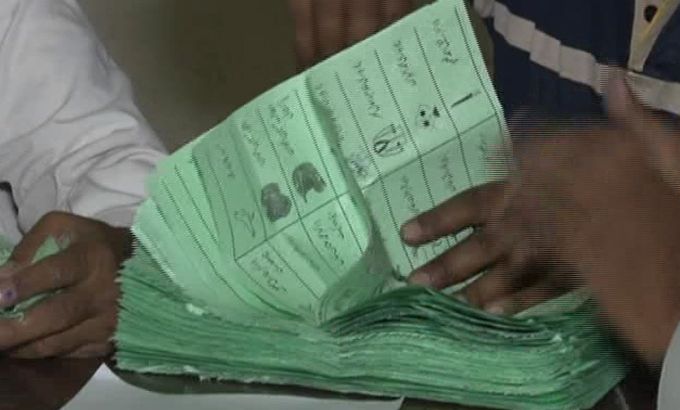Polls close in Pakistan elections
Pakistan’s landmark election winding down after millions turned up to vote despite violent attacks on polling day.

Votes are being counted in Pakistan after historic elections that will see the handover of power from one civilian government to another.
Official results aren’t expected before Sunday.
Voting hours were extended in Karachi on Saturday after allegations of irregularities there, according to the country’s own election commission, which also announced that re-polling will take place in more than 40 stations.
“We have been unable to carry out free and fair elections in Karachi,” it said in a statement. It is unclear whether the commission’s conclusion means national elections will have to be held again.
European Union observers, however, have stated that the process has improved compared to the electoral process five years ago.
Michael Gahler, chief EU observer, told Al Jazeera that the group had noted “considerable improvements”.
Al Jazeera’s Mike Hannah reporting from Islamabad, confirmed that all polls are closed “having been extended for a series of reasons ranging from administrative failure to security concerns.”
“At stake are the 342 seats in the national parliament…the early indications are that the early percentage [for voter participation] polls will be way over 50 percent, remembering that the highest percentage poll in any Pakistani election has been just over 45, so this indicates a massive turnout and a very strong rejection of the Pakistani Taliban, and its calls to boycott the voting process,” said Hanna.
He added that most observers do not believe that any party will gain an absolute majority, “which would lead to the possibility of weeks of political haggling,” said our correspondent.
“Well, I would say that it would be a very strong message to the militants that the people of Pakistan have rejected the military approach and they are for democracy and they want Pakistan to be a normal country,” said retired army general Talat Masood, referring to the power struggle between the military and the Pakistani Taliban.
Al Jazeera’s Asad Hashim, reporting from Lahore, said that Nawaz Sharif, the leader of the PML-N, has just spoken to a crowd of about 300 people at his campaign headquarters in Lahore.
Speaking very much as a man who expects to form the next government, he did not rule out a coalition with any party, and thanked his supporters for voting for him.
The atmosphere here was charged, and PML-N supporters are ecstatic. They said Nawaz was best placed to lead Pakistan through the crises it is facing…particularly the energy crisis.
Violence at polls
As polls closed on Saturday, yet another explosion rocked Karachin, killing two and injuring five.
Millions streamed to polling stations across the country on Saturday despite threats from the Pakistan Taliban to disrupt the landmark elections.
Twin bombings killed 11 people and injured 37 others close to a polling station in the port city of Karachi on Saturday, underlining the dangers voters faced in participating in the vote.
Violence was also reported in Peshawar, where the AFP news agency reported female voters had been targeted in a bomb attack on a polling station in the northwestern city.
In North Waziristan, a notorious Taliban stronghold, mosque loudspeakers announced that no woman would be allowed to leave their home to vote, according to local residents. Women’s turnout is traditionally low in conservative areas.
The election marks the first time in the country’s 65-year history that a civilian government has completed its full term and handed over power in democratic elections.
Previous governments have been toppled by military coups or sacked by presidents allied with the powerful army.
The Taliban have waged a campaign of attacks against the main secular parties, killing more than 130 people in what has been called the country’s deadliest election in history.
Deadly violence struck again on Friday, with a pair of bombings against election offices in northwest Pakistan that killed three people and a shooting that killed a candidate in the southern city of Karachi.
Frontrunner Sharif
The frontrunner is ex-prime minister Nawaz Sharif, head of the centre-right Pakistan Muslim League-N (PML-N) but much of the attention has been focused on cricket star Imran Khan.
Khan appeals mostly to young, urban voters because of his calls for an end to corruption, a new political landscape and a halt to U.S. drone strikes on Pakistani soil. About one-third of the country’s population is under the age of 30.
The 60-year-old leader of Pakistan Tehreek-e-Insaf (PTI) tapped into a last-minute surge of support after fracturing his spine when he fell from a stage at a campaign rally on Tuesday.
If Khan’s party can take enough votes away from Sharif, it might open the way for the outgoing centre-left Pakistan People’s Party (PPP) to once again form the government.
Despite widespread unhappiness with the party’s performance over the past five years, it does have a loyal following in rural areas of southern Sindh province and southern Punjab.
The main issues are the troubled economy, an appalling energy crisis which causes power cuts of up to 20 hours a day, the alliance in the US-led war on armed groups, chronic corruption and the dire need for development.